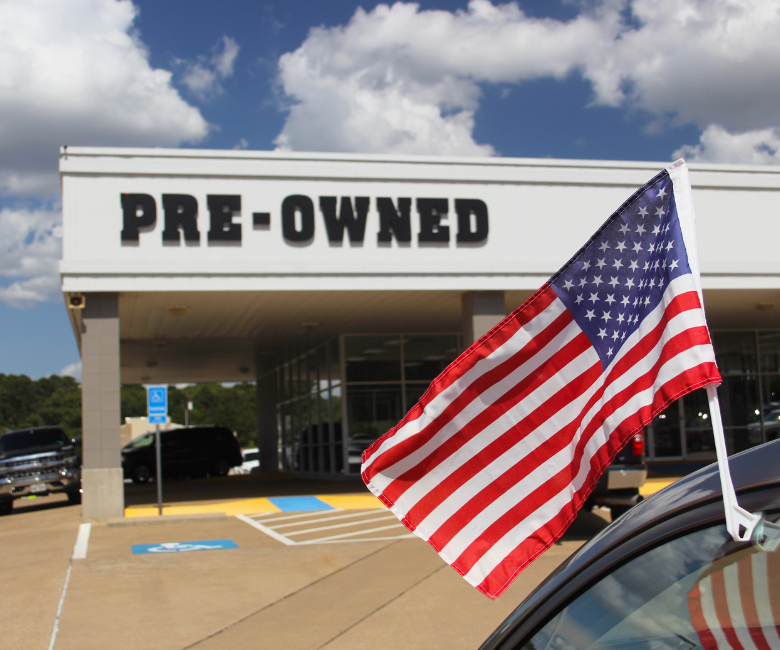
7 Essential Tips for Buying a Used Car for the First Time
- PEAK Squad
- PEAK
- August 8, 2024
Follow along for seven essential tips on what to look out for when buying a used car.
Though used car prices are coming down after soaring to unprecedented highs during the pandemic, consumers are still spending a pretty penny for a pre-owned ride. According to Consumer Reports data from April 2024, the average cost of a used car in the United States is about $28,550.
It's critical to do proper due diligence — especially if it's your first time through the process. Knowing how to buy a used car without getting taken for a proverbial ride is a valuable skill, and it's one you can hone by following these essential tips.


1. Identify a vehicle to target
The best way to buy a used car is to start by targeting makes and models. To that end, here's a roadmap you can follow:
- Make a checklist of essential features you want your car to have, and limit your search to matching vehicles.
- Research vehicle-specific ownership costs including insurance rates, typical repair costs, and fuel efficiency. If you're on a tight monthly budget, prioritize opportunities to save.
- Check each vehicle brand's reliability ratings using a reputable third-party research source like Edmunds or JD Power.
Unless you feel super strongly about a particular make and model, it's best to include multiple vehicles on your final shortlist. That way, you'll have more flexibility as you enter the market.
2. Set your budget before you shop and finance in advance
Buyers often fall into the trap of focusing too much on biweekly or monthly payment costs and not enough on the total cost of the purchase. Unscrupulous dealerships with in-house financing programs know this, and exploit their customers by constantly centering discussions on installment costs rather than the total amount of money at stake in the transaction.
If you're going to finance your purchase, look carefully at loan terms and interest rates. It's definitely important to buy a vehicle with payments you can easily afford, but you'll end up paying way more if you extend those payments out across long loan terms at high interest rates.
Run some numbers with an auto loan calculator like this one, and try to find a sweet spot between payment affordability and the total cost you'll pay in the end. Use that research to set a maximum purchase price, then stick to it.
Another helpful trick is to finance in advance through a bank or another private lender. This ensures you'll stay within the budget you set while also dodging shady dealer-based financing programs.
3. Price your trade-in
Dealers commonly allow buyers to trade in their current vehicles to receive a credit on the price of the car they're acquiring. Buyers often gloss over this part of the transaction by accepting the dealer's trade-in offer at face value, which can be a costly mistake.
Knowledge is key. First, research the fair market value of your current vehicle. You won't receive that full value from the dealer, since they also need to make a profit on the transaction. However, you will protect yourself from lowball trade-in offers.
Next, maximize the value of your trade-in:
- Collect trade-in offers from multiple dealers.
- Negotiate the value of your trade-in separately from the purchase price of the car you're buying.
- Perform basic maintenance and clean your vehicle before you have its trade-in value assessed.
Our new car care guide and spring maintenance checklist are filled with helpful DIY tips for improving your vehicle's condition before you trade it in.


4. Weigh the pros and cons of dealers and private sellers
Experts are divided on whether it's better to buy from a dealer or a private seller. Either one can work, as long as you're aware of the advantages and pitfalls associated with both.
This handy table summarizes the main factors in play:
|
Pros |
Cons |
|
|
Dealer |
More financing options |
Buyers tend to pay more when purchasing from a dealer |
|
Private Seller |
Buyers generally have more bargaining power |
Relatively weak consumer protections for private sales increase risk for buyers |
5. View the vehicle in daylight
When it comes time to view the vehicle, set up a daytime appointment. This will make it easier to spot any cosmetic defects and visible signs of wear and tear that might have eluded you at night.
If you're dealing with a private seller, it can help to treat the meeting like a first date with someone you connected with online by meeting in public at a neutral location. It's safer for both parties.
What to look for when buying a used car
When buying a used car, take a close look at every aspect of the vehicle. Inspect the exterior, interior, and under the hood. Look for:
- Evidence of accidents or bodywork, such as welding marks, inconsistent paneling, uneven tire wear, and/or used airbags
- A leak-free engine and a noise-free exhaust system with normal emission levels
- Illuminated warning lights on the instrumentation panel
- Fully functional headlights, taillights, and turn signals
- A smooth, responsive transmission
If you have limited mechanical knowledge of cars, or if you have any doubts about the vehicle's condition, ask the seller if you can take the vehicle for a third-party inspection. Sellers who have nothing to hide won't usually object to this request.
Importantly, you should also be ready to walk away from a potential purchase if your due diligence uncovers something you aren't prepared to deal with.
6. Check the vehicle's history
Before you proceed with any transaction, research the vehicle's ownership and accident history. Many reliable, low-cost online services allow you to perform these checks using the vehicle identification number (VIN) of the car you're considering.
While it's wise to do this research no matter where you're buying the car, it's especially important if you're negotiating with a private seller who may not be entirely honest about the vehicle's history. Compare your findings against the documentation the seller supplies to ensure fully consistent accuracy.
7. Get everything in writing
By default, dealers will document the sale terms in writing as part of the transaction process. Read the document before you sign it, and make sure everything accurately reflects what you negotiated.
If you buy from a private seller, both parties should sign a legally binding document that indicates, at minimum, the following details:
- The vehicle's make, model, year, and mileage
- Your agreed-upon sale price
- Each party's contact information
When you buy from a private seller, you're typically buying the vehicle "as is." You'll have limited legal protection if something ends up being wrong with it, which is part of the risk you assume in exchange for the potential to get a better deal.
However, you do have some rights — especially if the seller misrepresented the vehicle — and you should know what they are.
Keep your ride in PEAK condition
After you've finalized your vehicle purchase, it's time to focus on caring for your new ride. PEAK Auto features a complete lineup of everyday essentials that can help maximize your vehicle's lifespan.
Start by reviewing these essential car care tips, then load up on premium products. PEAK offers high-performance coolant and antifreeze for all makes and models, durable and long-lasting wiper blades, specially formulated windshield wash, and expert-approved automotive lighting products for maximum visibility.
Give your new ride the love it deserves by keeping it in PEAK condition!

